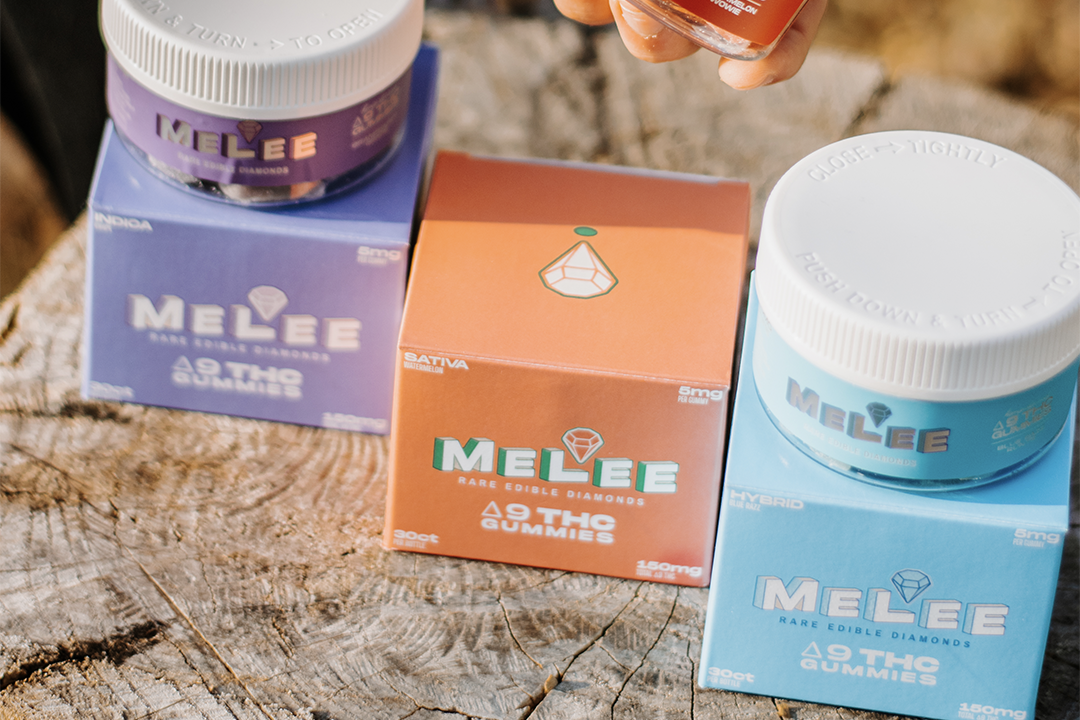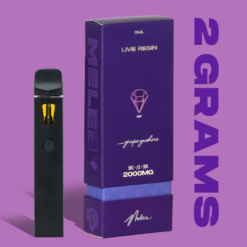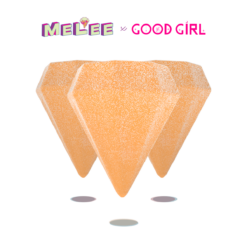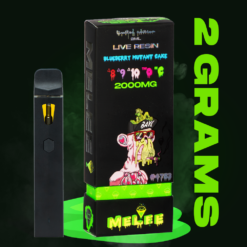With new cannabinoids earning their spot in the limelight, cannabis researchers and manufacturers are able to create new products using alternative cannabinoids like THCA, among others – giving cannabis enthusiasts new ways to get high and enjoy its benefits.
THCA might not have the psychoactive effects of Delta-9 THC, which is the main psychoactive substance in weed and hemp plants, but there are various methods and instances where THCA can convert to Delta-9. This article will explain everything you need to know about THCA and Delta-9, and how these two cannabinoids are correlated.
But before we dive in, you should check out our store and browse our wide selection of Delta-9 products!
Key Takeaways
- THCA and Delta-9 THC are two chemical compounds in cannabis with different effects.
- The decarboxylation process is necessary for THCA to convert into Delta-9 THC, allowing non-psychoactive THCA to transform into a psychoactive compound. This can happen via heat or exposure to light.
- THCA offers potential therapeutic benefits like anti-inflammatory and neuroprotective effects, while Delta-9 THC is known for its psychoactive and relaxing effects. Users can choose products based on their preferred effects and benefits.
What Is Delta-9 THC?
Delta-9 THC, or simply just THC, is the main psychoactive substance in cannabis and hemp plants. It is responsible for getting users high, and it is probably the main reason why people love smoking weed or consuming edibles.
Its euphoric and mind-altering effects make Delta-9 THC an awesome experience, whether you are consuming Delta-9 from cannabis or hemp-derived Delta-9 THC.
But aside from getting high, Delta-9 also has benefits and risks – which is why we always encourage users, especially first-time users, to purchase Delta-9 products from sources they can trust to ensure its safety and accurate effects.
Delta-9 THC affects brain neurotransmitters, which leads to feelings of relaxation and euphoria. Although more research is needed, there are other effects connected to THC, and anecdotal evidence suggests that it may also influence appetite, pain, and sleep.
Although it is said to have other medicinal value, consuming Delta-9 THC may also have side effects such as short-term memory loss, paranoia, cottonmouth, anxiety, and more. However, according to user reports, these side effects happen when the user consumes too much and more than they can handle.
Delta-9 THC from cannabis plants is not yet legal at a federal level. However, some states have legalized it for recreational use, and even more states have legalized it for its potential health benefits – despite being a Schedule I substance in the United States.
But luckily, cannabis smokers can still get high in most states that comply with the 2018 Farm Bill that legalizes the use of hemp-derived cannabinoids – as long as it doesn’t go over the specific THC limit of 0.3% on a dry weight basis.
What Is THCA?
Now that you know what Delta-9 THC is, it’s time to look at THCA or tetrahydrocannabinolic acid – which is the precursor of Delta-9 THC. Although THC has the letters T, H, and C, it is not a psychoactive substance. Well, at least not yet in that form.
THCA is found in raw and young cannabis plants. It is found in all parts of a cannabis plant and is the most abundant cannabinoid during the early stages of the plant’s growth. THCA is often used to make cannabis edibles and tinctures because of its potential therapeutic benefits.
Although it is non-psychoactive, it can become psychoactive once it converts into Delta-9 THC when the plant matures or when it gets exposed to heat through a process called decarboxylation.
Some of its therapeutic effects include anti-inflammatory, antiemetic, and neuroprotective effects – but more research is still needed to prove these potential health benefits.
What Is Decarboxylation?
To answer the question, “Does THCA convert into Delta-9 THC?” The key to making that happen is through a process called decarboxylation. This process plays a critical role in knowing the effects of a certain cannabis strain, and it is responsible for converting THCA into Delta-9 THC.
How Does Decarboxylation Work?
This process removes the carboxyl group found in THCA, and it is done by exposing the plants or THCA products to heat and light. Decarboxylation is the only way to activate THCA and turn it into something that can get you high.
For example, if you are consuming products like THCA diamonds, it requires a specific amount of heat, meaning one of the best ways to do it is with the use of a dab rig – where you heat the THCA diamonds and inhale the smoke.
Even smoking THCA flower converts it into THC when burned, but dabbing might be the best option if you are looking for a very potent high that could glue you to your couch – but we don’t recommend this option for users with a lower tolerance because it could lead to side effects like cottonmouth, short-term memory loss, and even nausea.
The most common way of decarboxylation is through smoking or vaping. If you buy THCA vapes, once you hit the fire button or activate the vape by hitting the device, it will vaporize at a specific temperature that will activate the THCA and turn it into THC before inhaling.
But most products, like our Orange Creamsicle Disposable Vape, already have activated Delta-9 THC and other cannabinoids and terpenes, which makes the process of getting high more convenient since you don’t have to worry about THCA percentages and how to make the most out of the decarboxylation process.
It might be important to note that even activated THC products might have a little bit of THCA in them due to the temperature of the heat given when they went through decarboxylation. In addition, THCA must be present if users want to balance out the euphoric or psychoactive effects with the strain’s potential health benefits.
Can You Decarboxylate THCA On Your Own?
Yes, you can decarboxylate THCA on your own at home, and the chances are – you have been doing this already, especially if you have been consuming cannabis for a while now.
Here are some of the most popular ways to decarb THCA at home:
- Vaping – This is one of the most popular and most convenient ways to decarb THCA and turn it into THC. Because you don’t need complicated dab rigs, you can decarb THCA with a puff or a press of a button. Plus, most vape products already come with everything you need.
- Dabbing – If you want to get the most out of your THCA, dabbing might be the most effective option. However, it can be overly complicated since you need a dab rig.
- Smoking – Smoking cannabis is probably the most common method, and you have probably been doing it unknowingly. Burning the flower decarboxylates the remaining THCA in cannabis flowers, but some of it is lost in the process.
- Cooking or baking – When you make cannabutter or bake cannabis edibles using stems, trimmings, and other low THC plant components, you are converting the THCA into THC, making them psychoactive.
Key Differences Between Delta-9 vs. THCA
We already established that THCA and Delta-9 THC are two different cannabinoids, but the key differences are their effects, chemical structure, and legal status.
The effects of THCA are non-psychoactive, meaning it cannot get you high unless you convert it into THC through the decarboxylation process. Before the conversion happens, these two cannabinoids also have different chemical structures.
Delta-9 THC has double bonds between the 9th and 10th carbon atoms. On the other hand, THCA does not have any double bonds, but it has a carboxylic acid group, and it does not bond with the CB1 and CB2 receptors in your endocannabinoid system, hence its non-binding and non-psychoactive effects.
Lastly, the legal status of each cannabinoid depends on where they are extracted from. Hemp may be legal at a federal level because of the 2018 Farm Bill, but marijuana is still illegal in most states.
Potential Benefits Of Delta-9 vs. THCA
THCA might be the precursor of Delta-9 THC, but their effects and benefits are significantly different.
When you consume THCA, you can expect a more energetic, creative, and uplifting experience. You might still feel a little relaxation with THCA, but in a non-psychoactive way – which is why many users prefer using THCA to enjoy the many benefits without getting high.
On the other hand, Delta-9 THC produces psychoactive and intoxicating effects that many people enjoy – but not all of them. It is known for creating an intense, relaxing, and euphoric atmosphere for users, and it is also the effect that gets people coming back for more.
Although more research is needed to prove their health benefits, early and anecdotal evidence suggests that THCA has anti-inflammatory and pain-relieving properties. According to user reports, it is also being compared to the effects of CBD, which helps with your overall well-being and balance.
Where To Buy Delta-9 Products Online
While we do not sell any THCA products (yet), we have an ample selection of vapes and gummies with activated Delta-9.
If you want to experience these effects, you can try some of our edibles, such as the Blue Razz – Runtz Gummies, which are flavorful and potent gummies that you can conveniently enjoy after a long day of work and errands.
If you want something with more of a punch, then go for our White Peach – Mimosa Live Resin Gummies. These bubbly treats are made with live resin HHC and Delta-9 to deliver a gentle buy mood-lifting high that will get you to celebrate.
If you are not into edibles that much, vaping might be a good choice. Our sweet and potent Wedding Cake Live Resin Disposable Vape is one of our best-sellers for a reason. It does not only produce a mind-blowing high, but it also contains well-curated terpenes and cannabinoids that give users the best experience. Plus, you can enjoy it right out of its packaging without any decarboxylation to worry about.
Does THCA Convert To Delta-9: Final Thoughts
After taking a deep look into it, THCA does convert into Delta-9 THC. It can either be forced when you expose the THCA to heat or it can convert naturally as the plants mature over time. However, the THC percentages will vary depending on how the conversion process was administered.
FAQs
Is THCA The Same As Delta-9?
In case you were wondering if THC is the same as Delta-9, the answer is they are not the same. Although they are both cannabinoids, they produce different effects and have different chemical components. THCA cannot get you high unless it is converted into THC through the process of decarboxylation.
Does THCA Turn Into Delta-9 When Smoked?
THCA can turn into Delta-9 when smoked, but the best way to convert THCA into Delta-9 is by waiting for plants to mature so that they can convert naturally without any chemical or heating process. However, the potency of the product or strain also depends on the type of THCA product and how it is consumed.
For example, if you are taking THCA gummies, you will not feel high because there is no heating element that will convert the THC into Delta-9. Taking Delta-9 gummies, on the other hand, will provide will have psychoactive effects.
Is THCA Stronger Than Delta-9?
THCA is not stronger than Delta-9 in terms of getting high because THCA is not a psychoactive substance. However, the amount of THCA in plants can affect the THC percentage as the plant matures or when it goes through the decarboxylation process. Meaning the higher the THCA, the higher you will get when converted into THC.
Is THC Delta-9 Or THCA Better?
It depends. THCA might be better if you are in for the therapeutic effects alone without getting high. Although THCA can convert into THC when burned or exposed to heat – the better option still depends on the users’ preference. If you want to get high without needing to convert THCA, you can buy Delta-9 products instead.







